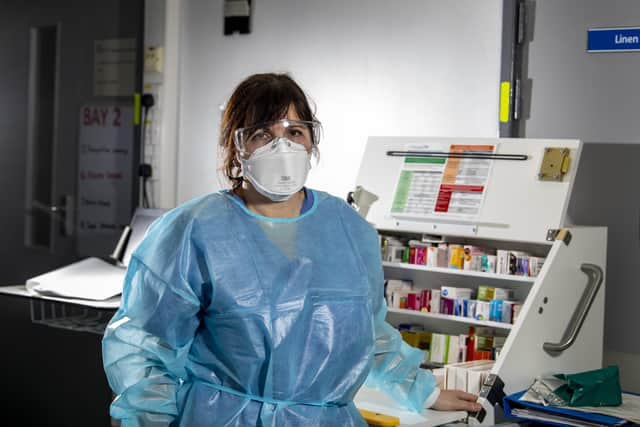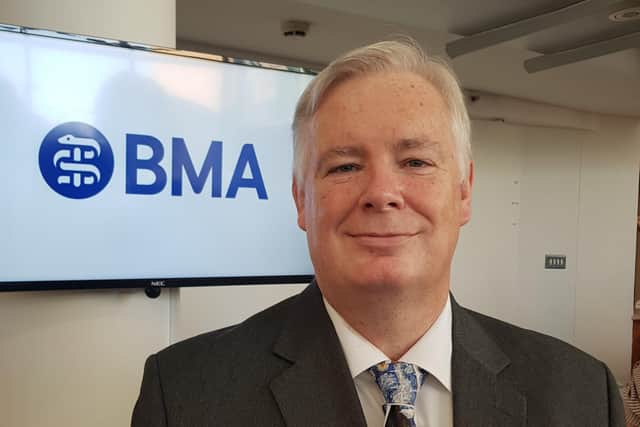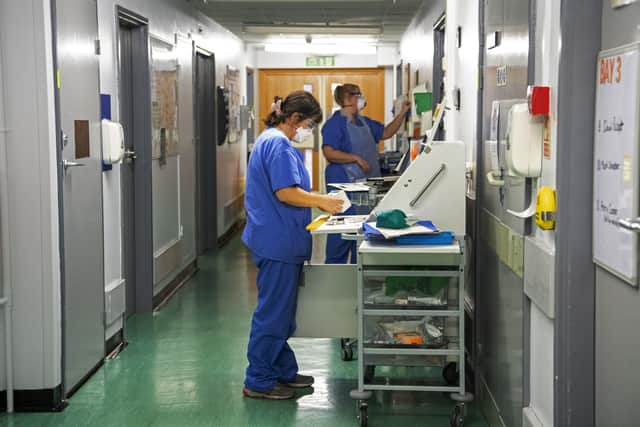Our plea from Yorkshire’s NHS front line in virus fight – Dr Brian McGregor
Sir Patrick Vallance, the Government’s chief scientific advisor had suggested the same to MPs a few days earlier.
At the time, many could not have imagined as many as 20,000 lives would be lost to coronavirus. However, last week we passed the tragic and truly disturbing milestone of 100,000 deaths in the UK, including more than 10,000 here in Yorkshire.
Advertisement
Hide AdAdvertisement
Hide AdIt is difficult to really contemplate the scale of human suffering lying behind this number. Each statistic is a person who has lost their life: someone’s parent, partner, child, or friend, and the families that they leave behind.


On behalf of the medical profession in Yorkshire, I send my heartfelt condolences to the families and friends of loved ones who have lost their lives.
It is crucial that we learn the lessons of this tragedy. We must understand why so many lives have been lost so that we can prevent this scale of death from coming to pass in any future health crisis.
Boris Johnson told the nation that he takes ‘full responsibility’ for the handling of the pandemic. He must though make sure that every conceivable effort is now made to minimise the further loss of life.
Advertisement
Hide AdAdvertisement
Hide AdCase rates are beginning to plateau and we have the promise of the vaccine rollout, but make no mistake, we are still in the midst of this pandemic.


Our hospital wards remain full, non-Covid patients are having treatments delayed and our workforce is exhausted. The NHS is in a perilous position.
Without doctors, nurses and other healthcare workers there is no NHS, and so these vital staff must be looked after, both physically and mentally. Not just for their own safety, but for that of their patients too.
We know that among the dead are some of our colleagues who were not properly protected from the virus and we must not allow this to happen again.
Advertisement
Hide AdAdvertisement
Hide AdIt is crucial that we ensure staff are protected, both through the vaccinations and proper access to suitable PPE.


It is equally important that their wellbeing is looked after.
They have been working longer hours, often in unfamiliar settings, under increased pressure – all while witnessing a large number of patients dying each day. Understandably this has had a significant impact on the wellbeing of many doctors.
Indeed, the BMA’s most recent survey revealed that almost 65 per cent of doctors in Yorkshire are now suffering from some form of anxiety or depression, with 54 per cent of these saying their condition had worsened since the start of the pandemic. They must have the necessary support available to them both now and in the future.
Advertisement
Hide AdAdvertisement
Hide AdThe vaccine is the route out of this terrible situation, and with nearly 10 million people already receiving their first dose, it is vital that this progress continues. Doctors need to be able to plan properly, to avoid waste and get our most vulnerable patients and healthcare workers protected urgently.
To do that, first and foremost, we need honesty and transparency from the Government about supplies and distribution and as more routes for vaccinations are opened up, there must be clear information to patients (and doctors) about how, when and where they are to be vaccinated to avoid duplication of work.
The key will be ensuring maximum take-up and we know some groups are less likely to come forward for immunisation. We know that the virus has had a devastating impact on our BAME communities and it is concerning that data shows hesitancy around vaccines is higher among certain ethnic minority communities, leading to lower uptake. We continue to call on the Government to do much more to build trust with ethnic minority communities.
The public also have their part to play in how we manage our way out of the pandemic. We must not be lowered into a false sense of security through the promise of the vaccine.
Advertisement
Hide AdAdvertisement
Hide AdIt is imperative that we all continue to adhere to public health rules; staying at home, washing hands and wearing face masks where appropriate.
Even if you have had your first vaccination you can transmit the virus and so maintaining the guidance is vital.
The road ahead remains challenging and now is the time to redouble our commitment to reducing the spread of infection, vaccinate the population and protect one another from this deadly disease.
Dr Brian McGregor is chair of the BMA Yorkshire regional council.
Advertisement
Hide AdAdvertisement
Hide AdSupport The Yorkshire Post and become a subscriber today. Your subscription will help us to continue to bring quality news to the people of Yorkshire. In return, you’ll see fewer ads on site, get free access to our app and receive exclusive members-only offers. Click here to subscribe.
Comment Guidelines
National World encourages reader discussion on our stories. User feedback, insights and back-and-forth exchanges add a rich layer of context to reporting. Please review our Community Guidelines before commenting.